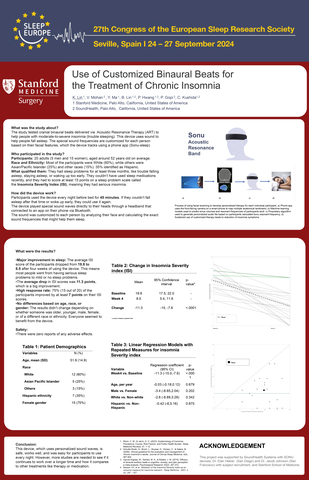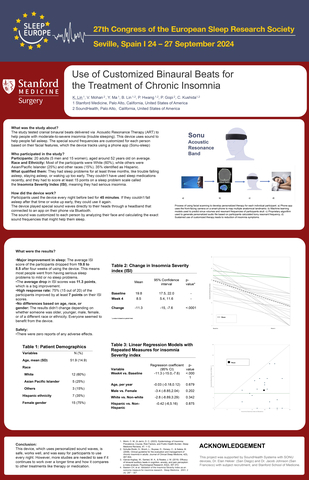PALO ALTO, Calif.--(BUSINESS WIRE)--A groundbreaking study from researchers at Stanford Medicine and SoundHealth presents a new, non-invasive therapy for chronic insomnia using customized binaural spatial audio delivered via an acoustic resonance therapy (ART) headband. Chronic insomnia, which affects 10% to 15% of the adult population, often leads to reduced quality of life and is associated with multiple health risks, including cardiovascular disease and depression.
The study involved 20 participants diagnosed with moderate-to-severe insomnia, who were treated using personalized acoustic resonance therapy. By utilizing the SoundHealth SONU headband in conjunction with a special smartphone-based app Sonu-Sleep that integrates facial scanning and machine learning, personalized binaural audio tracks were created to match each participant’s unique cranio-facial resonance frequencies.
Key findings
- After four weeks of treatment, nearly half of the participants (45%) achieved an Insomnia Severity Index (ISI) score below 7, indicating a clinically significant resolution of insomnia.
- Participants experienced an average reduction of 11.3 points on the ISI scale, demonstrating the treatment's effectiveness.
- Adherence to the protocol was 100%, with no adverse effects reported.
“This is an exciting step forward in non-pharmacological insomnia treatment,” said Dr. Kevin Lin, M.D., Stanford Medicine, the co-author and lead researcher of the study.
“These initial results are encouraging, showing potential for acoustic resonance therapy as a non-invasive, safe adjunctive treatment for insomnia. It is important to recognize that it should be part of a comprehensive approach, including sleep-related behavioral improvement, and further studies are needed to confirm its long-term efficacy and broader applicability; however, this early data is remarkable, and we look forward to deepening our understanding of this innovative approach,” said Robson Capasso, M.D., FAASM, Chief of Sleep Surgery, Professor of Otolaryngology, Head and Neck Surgery and by courtesy of Psychiatry and Behavioral Sciences, Stanford University.
Future directions
The promising results of this pilot study pave the way for larger trials to confirm the long-term effectiveness and sustainability of this therapy. The research team also aims to explore additional applications of acoustic resonance therapy in treating other sleep disorders.
This project was supported by SoundHealth Systems, which provided the SONU devices, and the Stanford School of Medicine. The study was presented at SLEEP Europe — the 27th Congress of the European Sleep Research Society in Seville, Spain on September 27, 2024.
About SoundHealth
SoundHealth is a medical technology company that harnesses the power of artificial intelligence and medical science to improve respiratory and mental health. The SoundHealth team consists of experienced medical professionals, data scientists and engineers who are passionate about improving healthcare. SoundHealth investors include Moai Capital, J4 Ventures, TeleSoft Partners, Tau Ventures, TechU Ventures, and Rhythm Venture Capital. For more information, visit https://soundhealth.life.




